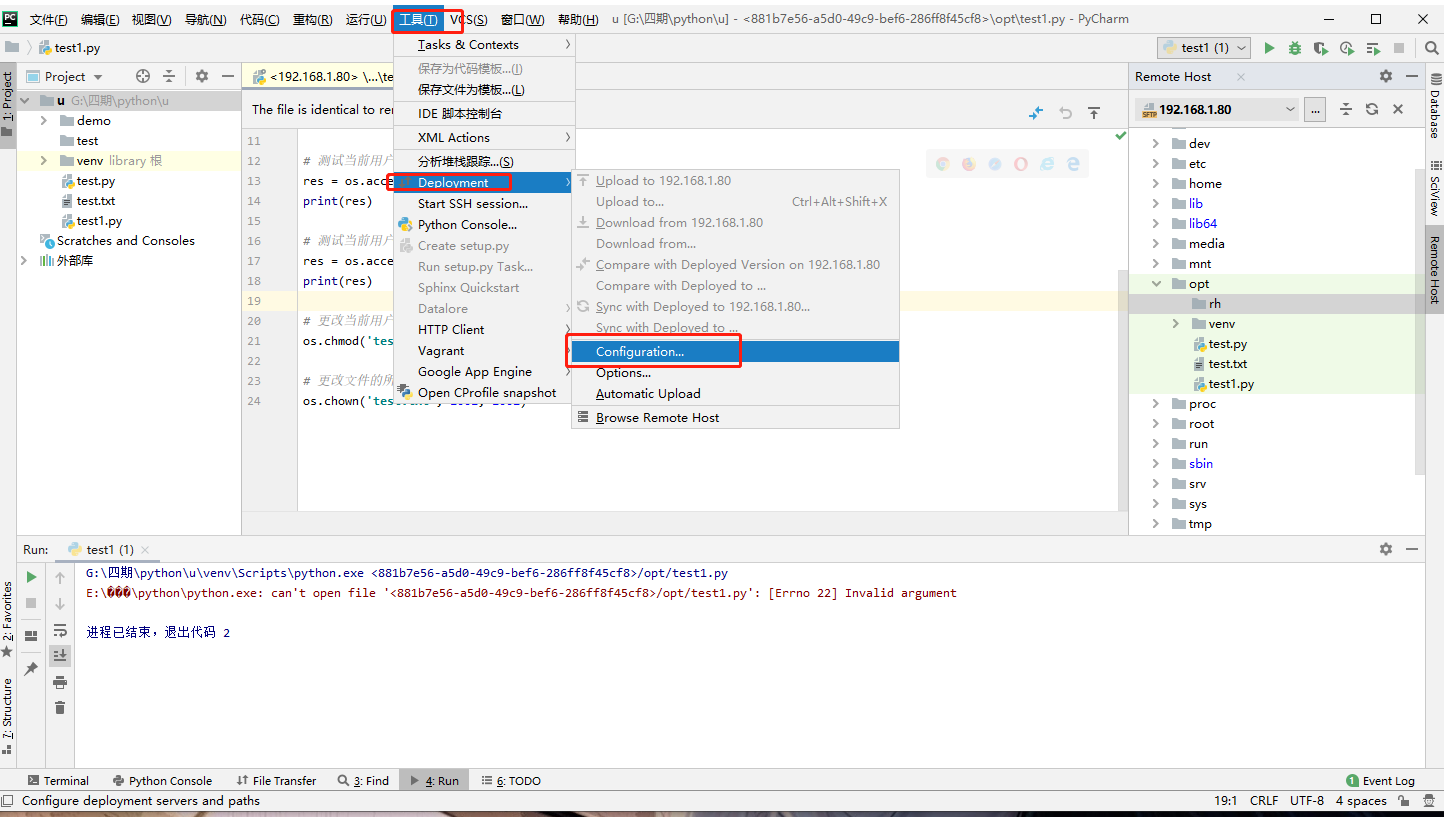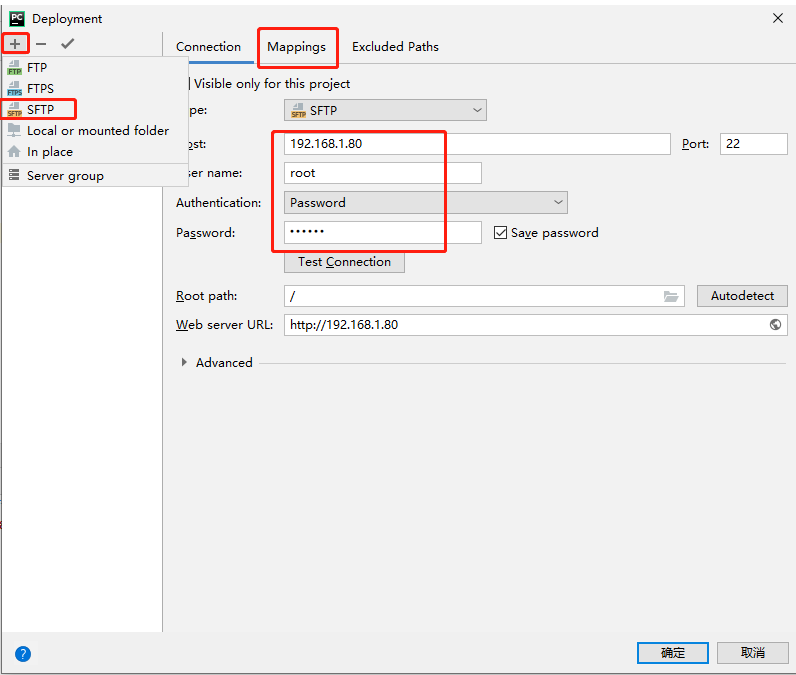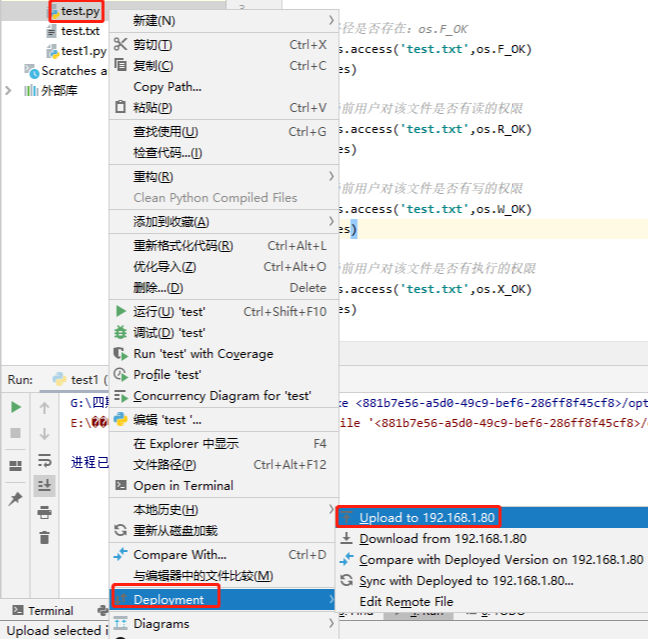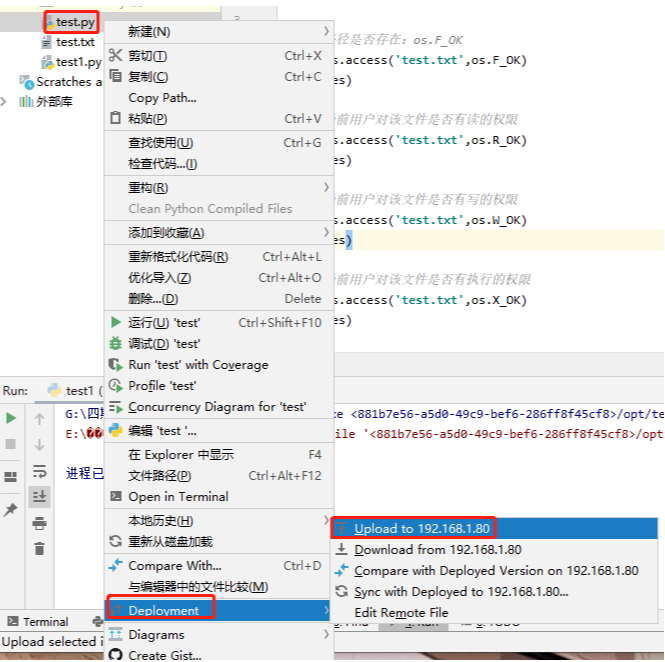What is an os module
The os module provides the function interface functions of most operating systems. When the os module is imported, it will adapt to different operating system platforms and perform corresponding operations according to different platforms. When programming in python, it often deals with files and directories. At this time, the os module is indispensable. This section will give a detailed interpretation of the functions provided by the os module
1, Using scripts to automatically install Python versions
Requirement: no Python 3 system installed
If you have installed Python 3, you can only choose a different version to install
1. PyCharm connecting to Linux



2. os module executes shell command
The function of os.system():
Execute shell command Returns the return value of the shell command The output of the command is output to standard output
Code demonstration:
os.system('cls')
Script to install Python automatically
(1) Implementation steps:
Download Python source code Required dependency libraries for Python installation Compiling and installing Python
(2) Pseudo code:
1. Judge whether the user is root 2. If yes, wait for the user to enter Python version 3. Execute the shell command to download the source package 4. Installation depends on development package 5. Compile and install Python
(3) The script content is as follows (based on Python 2):
auto_install_python.py
# coding=utf-8
import os
# Judge whether the user is root
if os.getuid() == 0:
pass
else:
print('The current user is not root User!')
SystemExit(1)
# Install Python dependency Library
cmd_module = 'yum -y install wget gcc zlib-devel bzip2-devel openssl-devel ncurses-devel sqlite-devel readline-devel tk-devel gdbm-devel db4-devel libpcap-devel xz-devel libffi-devel'
res = os.system(cmd_module)
if res != 0:
print('Python Dependency library installation failed, please execute the script again!')
SystemExit(1)
else:
print('Python Dependency library installed successfully!')
# Enter Python version, Download Python source package to local directory
# weget url
version = raw_input('Please enter python Version: (3.6/3.8)')
if version == '3.6':
url = 'https://www.python.org/ftp/python/3.6.10/Python-3.6.10.tgz'
else:
url = 'https://www.python.org/ftp/python/3.8.2/Python-3.8.2.tgz'
cmd = 'wget ' + url
res = os.system(cmd)
if res != 0:
print('Python Source package download failed!')
SystemExit(1)
else:
print('===============================>>>Python Source package download succeeded!')
# Unzip Python source package
# tar zxvf Python-3.8.2.tgz
if version == '3.6':
package_name = 'Python-3.6.10'
else:
package_name = 'Python-3.8.1'
res = os.system('tar zxvf ' + package_name + '.tgz')
if res != 0:
print('Decompression failed!')
SystemExit(1)
else:
print('=============<<Decompression succeeded!>>===============')
# Necessary configuration, otherwise error: "make: *** [pybuilddir.txt] error 1"
# export LANG=zh_CN.UTF-8
# export LANGUAGE=zhb_CN.UTF-8
cmd_export_lang = 'export LANG=zh_CN.UTF-8'
cmd_export_language = 'export LANGUAGE=zhb_CN.UTF-8'
res1 = os.system(cmd_export_lang)
res2 = os.system(cmd_export_language)
if res1 != 0 or res2 != 0:
print('Configuration failed, please check the script before running!')
SystemExit(1)
# Switch Python directory
os.chdir(package_name)
os.system('./configure --prefix=/usr/local/python3')
res = os.system('make && make install')
if res != 0:
print('Source compilation failed!')
SystemExit(1)
else:
print('=========<<Python Installation succeeded, please verify!>>==========')
# Modify user environment variables
os.system('echo "export PYTHON3=/usr/local/python3" >>~/.bash_profile')
os.system('echo "export PATH=$PYTHON3/bin:$PATH" >>~/.bash_profile')
os.system("source ~/.bash_profile")
os.system('cat ~/.bash_profile')
print('User environment variable has been changed, please verify!')
os.system('ln -s /usr/local/python3/bin/* /usr/local/bin')
os.system('python3 --version')3. Upload to Linux and execute

Linux execution
[root@python ~]# cd /opt/ [root@python opt]# python test1.py
2, Python's os module shell
Python's os module encapsulates common file and directory operations. This article only lists some common methods, and more methods can be viewed Official documents.
Here are some common uses:
| Method | Explain |
|---|---|
| os.mkdir | Create directory |
| os.rmdir | Delete directory |
| os.rename | rename |
| os.remove | Delete file |
| os.getcwd | Get current working path |
| os.walk | Traverse directory |
| os.path.join | Connection directory and file name |
| os.path.split | Split file name and directory |
| os.path.abspath | Get absolute path |
| os.path.dirname | Get path |
| os.path.basename | Get file or folder name |
| os.path.splitext | Separating file names from extensions |
| os.path.isfile | Determine whether the given path is a file |
| os.path.isdir | Determine whether the given path is a directory |
1. Install ipython
[root@root ~]# pip3 install -i https://pypi.douban.com/simple/ ipython
Launch ipython
[root@root ~]# ipython
If it cannot be started:
python3 -m IPython --version
To view the version of ipython, if you see the version information, you can use the python -m IPython command to start ipython
If you want to use the ipython command to start, you can add the following in the. Bash "profile under the user directory:
alias ipython="python3 -m IPython"
Launch ipython again
python3 -m IPython --version
That's it
2. Examples
The following directory structure is used as a reference for the following examples, and the working directory is / Users/ethan/coding/python.
Users/ethan
└── coding
└── python
├── hello.py - file
└── web - CatalogTake an example:
(1) os.path.abspath: get the absolute path of a file or directory
$ pwd
/Users/ethan/coding/python
$ python
>>> import os # Remember to import the os module
>>> os.path.abspath('hello.py')
'/Users/ethan/coding/python/hello.py'
>>> os.path.abspath('web')
'/Users/ethan/coding/python/web'
>>> os.path.abspath('.') # Absolute path to the current directory
'/Users/ethan/coding/python'(2) os.path.dirname: get the path of the file or folder
>>> os.path.dirname('/Users/ethan/coding/python/hello.py')
'/Users/ethan/coding/python'
>>> os.path.dirname('/Users/ethan/coding/python/')
'/Users/ethan/coding/python'
>>> os.path.dirname('/Users/ethan/coding/python')
'/Users/ethan/coding'(3) os.path.basename: get file name or folder name
>>> os.path.basename('/Users/ethan/coding/python/hello.py')
'hello.py'
>>> os.path.basename('/Users/ethan/coding/python/')
''
>>> os.path.basename('/Users/ethan/coding/python')
'python'(4) os.path.splitext: separating file names from extensions
>>> os.path.splitext('/Users/ethan/coding/python/hello.py')
('/Users/ethan/coding/python/hello', '.py')
>>> os.path.splitext('/Users/ethan/coding/python')
('/Users/ethan/coding/python', '')
>>> os.path.splitext('/Users/ethan/coding/python/')
('/Users/ethan/coding/python/', '')(5) os.path.split: separating directory and filename
>>> os.path.split('/Users/ethan/coding/python/hello.py')
('/Users/ethan/coding/python', 'hello.py')
>>> os.path.split('/Users/ethan/coding/python/')
('/Users/ethan/coding/python', '')
>>> os.path.split('/Users/ethan/coding/python')
('/Users/ethan/coding', 'python')(6) os.path.isfile: is it a file
os.path.isdir: is it a directory
>>> os.path.isfile('/Users/ethan/coding/python/hello.py')
True
>>> os.path.isdir('/Users/ethan/coding/python/')
True
>>> os.path.isdir('/Users/ethan/coding/python')
True
>>> os.path.isdir('/Users/ethan/coding/python/hello.py')
False(7) os.walk: traverse directory
os.walk is a common module for traversing directories. It returns a primitive ancestor containing three elements: (dirpath, dirnames, filenames). Dirpath is to return all the absolute paths in the directory in the form of string; dirnames is to return the folder names in each absolute path in the form of list list; filesnames is to return all the file names in the path in the form of list.
>>> for root, dirs, files in os.walk('/Users/ethan/coding'):
... print root
... print dirs
... print files
...
/Users/ethan/coding
['python']
[]
/Users/ethan/coding/python
['web2']
['hello.py']
/Users/ethan/coding/python/web2
[]
[]3. os module open file
The method is as follows:
os.open(filename, flag, [,mode])
flag Parameter Description:
file # Files to open flags # This parameter can be the following options, multiple separated by "|" os.O_RDONLY # Open as read-only os.O_WRONLY # Open in write only mode os.O_RDWR # Open read-write os.O_NONBLOCK # Open without blocking os.O_APPEND # Open as append os.O_CREAT # Create and open a new file os.O_TRUNC # Open a file and truncate it to zero length (must have write permission) os.O_EXCL # Returns an error if the specified file exists os.O_SHLOCK # Get shared lock automatically os.O_EXLOCK # Acquire independent lock automatically os.O_DIRECT # Eliminate or reduce cache effects os.O_FSYNC # Synchronous write os.O_NOFOLLOW# Don't track soft links mode # Similar to chmod().
4. os module operates on files
Common methods are as follows:
# read file os.read(fd, buffersize) # write file os.write(fd, string) # File pointer operation os.lseek(fd, pos, how) # Close file os.close(fd)
Code demonstration:
File creation and writing
import os
# Open file
fd = os.open("abc.txt", os.O_RDWR | os.O_CREAT)
# Write string
str = "Hello Python!"
ret = os.write(fd, bytes(str, 'UTF-8'))
# Enter return value
print("The number of bits written is: ")
print(ret)
print("Write succeeded")
# Close file
os.close(fd)
print("File closed successfully!!")The output results are as follows:
The number of bits written is: 13 Write succeeded File closed successfully!!
File read
import os
# Open file
fd = os.open("abc.txt", os.O_RDWR)
# Read text
ret = os.read(fd, 6)
print(ret)
# Close file
os.close(fd)
print("File closed successfully!!")The output results are as follows:
b'Hello ' File closed successfully!!
5. os module management files and directories
Common methods are as follows:
| os method | Explain |
|---|---|
| remove(path) | Delete file |
| rename(old, new) | Modify the file or directory name |
| getcwd() | Get current directory |
| listdir(path) | Returns a list of all files in the current directory |
| mkdir(path [,mode]) | Create directory |
| makedirs(path [,mode]) | Create a multi-level directory |
| rmdir(path) | Delete directory (directory must be empty) |
| removedirs(path) | Delete multi-level directory (directory must be empty) |
Code demonstration:
# coding=utf-8
import os
print(os.getcwd()) # pwd
print(os.listdir()) # ls
os.rename('abc.txt','test.txt') # mv abc.txt test.txt
os.remove('read.py') # rm -f abc.txt
os.mkdir('test') # mkdir dir1
os.makedirs('demo/abc') # mkdir -p dir2/dir22
os.rmdir('test') # Directory must be empty
os.removedirs('demo') #Directory must be empty6. os module management file permission
| os method | Explain |
|---|---|
| access(path, mode) | Judge the file permission: F ﹣ OK exists; < br > permission: R ﹣ OK, w ﹣ OK, X ﹣ OK |
| chmod(path, mode) | Modify file permission: 0o755 |
| chown(path, uid, gid) | Change the file owner to - 1 if not modified |
Code demonstration:
import os
# Test whether the path exists: OS. F ﹣ OK
res = os.access('test.txt',os.F_OK)
print(res)
# Test whether the current user has read permission to the file
res = os.access('test.txt',os.R_OK)
print(res)
# Test whether the current user has write permission to the file
res = os.access('test.txt',os.W_OK)
print(res)
# Test whether the current user has permission to execute the file
res = os.access('test.txt',os.X_OK)
print(res)
# Change the permissions of the current user
os.chmod('test.txt',0o755)
# Change the owner of the file
os.chown('test.txt', 1001, 1002) The premise of implementation is to ensure the existence of required documents.
7. os.path module manages files and paths
(1) Split path
| os.path method | Explain |
|---|---|
| split | Returns a binary containing the path and filename of the file |
| dirname | Return path to file |
| basename | Return file name |
| splitext | Returns a binary of the file extension and the part of the extension removed |
Code demonstration:
In [10]: os.getcwd()
Out[10]: '/opt/os_demo'
In [11]: os.listdir()
Out[11]: ['os_access.py', 'test.txt']
In [12]: path = '/opt/os_demo/test.txt'
In [13]: os.path.split(path)
Out[13]: ('/opt/os_demo', 'test.txt')
In [14]: os.path.dirname(path)
Out[14]: '/opt/os_demo'
In [15]: os.path.basename(path)
Out[15]: 'test.txt'
In [16]: os.path.splitext(path)
Out[16]: ('/opt/os_demo/test', '.txt')(2) Build path
| os.path method | Explain |
|---|---|
| expanduser | Expand the user's HOME directory, such as ~, ~ oracle |
| abspath | Get the absolute path of the file or path |
| join | Use different path separators to splice paths according to different operating system platforms |
| isabs | Check whether a path is an absolute path |
Code demonstration:
In [19]: os.path.expanduser('~')
Out[19]: '/root'
In [20]: os.path.expanduser('~oracle')
Out[20]: '/home/oracle'
In [21]: os.path.expanduser('~accp')
Out[21]: '/home/accp'
In [22]: os.path.expanduser('~acp')
Out[22]: '~acp'
In [23]: os.path.abspath('.')
Out[23]: '/opt/os_demo'
In [24]: os.path.abspath('..')
Out[24]: '/opt'
In [25]: os.path.join('/opt/os_demo','test.txt')
Out[25]: '/opt/os_demo/test.txt'
In [26]: os.path.isabs('/opt/os_demo/')
Out[26]: True
In [27]: os.path.isabs('.')
Out[27]: False(3) Get file properties
| os.path | Method |
|---|---|
| os.path.getmtime(path) | Return to the latest file modification time |
| os.path.getctime(path) | Return file path creation time |
| os.path.getsize(path) | Returns the file size, or an error if the file does not exist |
Code demonstration:
In [33]: os.path.getatime(path) Out[33]: 1587547270.7306058 In [34]: os.path.getmtime(path) Out[34]: 1587547270.7306058 In [35]: os.path.getctime(path) Out[35]: 1587548055.4721448 In [36]: os.path.getsize(path) Out[36]: 0
(4) Judge document type
| os.path method | Explain |
|---|---|
| os.path.isfile(path) | Determine whether the path is a file |
| os.path.isdir(path) | Determine whether the path is a directory |
| os.path.islink(path) | Determine whether the path is a link |
| os.path.ismount(path) | Determine whether the path is a mount point |
Code demonstration:
In [37]: os.path.isfile(path) Out[37]: True In [38]: os.path.isdir(path) Out[38]: False In [39]: os.path.islink(path) Out[39]: False In [40]: os.path.ismount(path) Out[40]: False